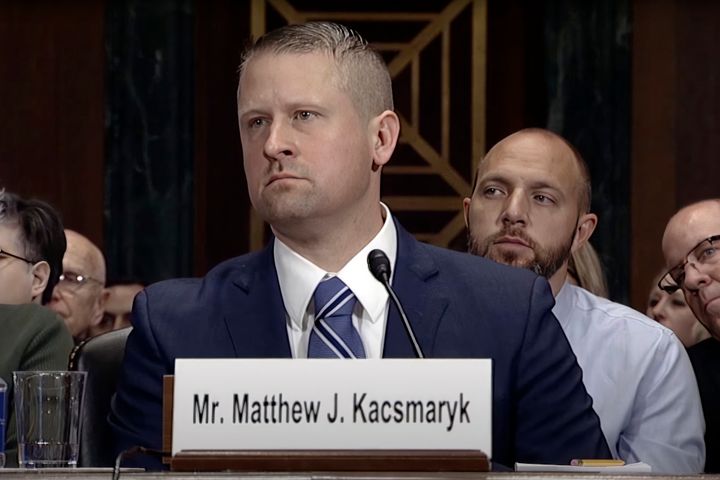The Judicial Conference of the United States announced new rules for the federal judiciary Tuesday that would prevent the practice of judge-shopping, where litigants choose where to file their suit based on the near-certain knowledge that a specific judge will hear their case.
Judge-shopping has come under increasing fire since President Joe Biden was elected. Conservative activist groups have sought to block his administration’s policies by filing lawsuits in federal courthouses where they expect to draw a sympathetic conservative judge to hear their case. Often the justification for the filing location rests only on a tenuous connection to the region.
The most glaring example occurred in the twin cases now before the U.S. Supreme Court that challenge the validity of the Food and Drug Administration’s approval of the abortion drug mifepristone and the Biden administration’s rules allowing the prescription drug to be mailed to patients.
Anti-abortion groups initially filed the suit at the federal courthouse in Amarillo, Texas. The location had nothing to do with any claim of harm caused by mifepristone in Amarillo. Instead, they chose that courthouse because they knew that Matthew Kacsmaryk was the only judge who drew cases there. Kacsmaryk, who was nominated by President Donald Trump and has a history of opposing reproductive rights, ruled as expected and imposed a nationwide injunction blocking the distribution of the drug in April 2023. An appeals court partially sided with Kacsmaryk, but the U.S. Supreme Court put that decision and Kacsmaryk’s injunction on hold before the month was out. Arguments in the case are scheduled before the high court on March 25.

The new rules issued by the Judicial Conference, the 26-member body that sets rules for the entire federal judiciary, save for the U.S. Supreme Court, would prevent such judge-shopping. Instead of allowing litigants to file suit in single-judge geographical divisions, the new rules, which take effect immediately, will require that a case seeking to bar or mandate actions by federal or state governments be randomly assigned to a judge from within the whole district, not just the smaller, single-judge division.
There are 13 federal circuit courts across the nation, with 11 circuits covering discrete geographical regions, one covering the District of Columbia and one for certain federal lawsuits. Texas, one of several states with single-judge districts, is within the jurisdiction of the U.S. Court of Appeals for the 5th Circuit and has within it four federal court districts (the Northern District, Eastern District, Southern District and Western District). Within those four judicial districts are 27 geographical divisions. Eight of those divisions, including the one covering the Amarillo area in the Texas Panhandle, have just one federal judge.
Under the new rules, lawsuits filed in a single-judge district will not automatically be assigned to that judge. Instead, the case will be randomly assigned to a judge from the entire judicial district.
If the mifepristone case had been filed under the new rules, for example, it would have been randomly assigned to one of the 11 U.S. district judges in the wider Northern District of Texas rather than simply going to Kacsmaryk. Ten out of those 11 judges are Republican appointees, but not all of them are known to be anti-abortion activists, such as Kacsmaryk.
The issue of judge-shopping has gained attention since Biden took office. Republicans including Texas Attorney General Ken Paxton and a plethora of conservative activist groups have routinely made use of Texas’ single-judge divisions to funnel cases to hard-right, Trump-appointed judges whom they expect to issue nationwide injunctions on Biden policies. Besides Kacsmaryk, federal judges Drew Tipton and James Wesley Hendrix, both Trump appointees in Texas; and Reed O’Connor, a George W. Bush appointee in Fort Worth, have also been regular targets for the filing of conservative lawsuits.

In 2021, Paxton filed suit in Kacsmaryk’s courthouse to block the Biden administration from reversing the Trump-era “Remain in Mexico” immigration policy. Kacsmaryk sided with Paxton and blocked the administration from revoking the harsh policy. His decision was eventually reversed by the U.S. Supreme Court but only after the high court allowed his injunction to remain in place for a year.
In another case filed by Paxton, Tipton blocked Biden’s 2021 executive order imposing a 100-day pause on the deportation of unauthorized immigrants. The Supreme Court reversed Tipton’s decision by a lopsided 8-1 vote in 2023, but it allowed his injunction to remain in place for the two years in between, thus preventing Biden from enforcing his own immigration policies.
In February, Hendrix declared a $1.7 trillion spending bill that Congress passed in 2021 unconstitutional because proxy votes were cast in the House during the COVID-19 pandemic. Though Hendrix did not nullify the entire law, he declared part of it unenforceable against the state government: the Pregnant Workers Fairness Act, which mandated that employers provide accommodations to pregnant employees.
The Department of Justice challenged each of these cases, plus the Kacsmaryk mifepristone ruling in 2023, for being improper instances of judge-shopping. They argued that each case should have been filed in a different venue ― one that actually had some connection to the issue.
Lawmakers had also raised concerns about judge-shopping in recent years. Sen. Mazie Hirono (D-Hawaii) introduced legislation to ban the practice in 2023, as did Sen. Ron Wyden (D-Ore.).
The Judicial Conference also noted a 2021 letter from former Sen. Pat Leahy (D-Vt.) and Sen. Thom Tillis (R-N.C.) stating their concerns about judge-shopping in patent cases. Additionally, Supreme Court Chief Justice John Roberts called for a study on the assignment of judges in patent cases in his 2021 year-end statement.
Disclaimer: The copyright of this article belongs to the original author. Reposting this article is solely for the purpose of information dissemination and does not constitute any investment advice. If there is any infringement, please contact us immediately. We will make corrections or deletions as necessary. Thank you.
